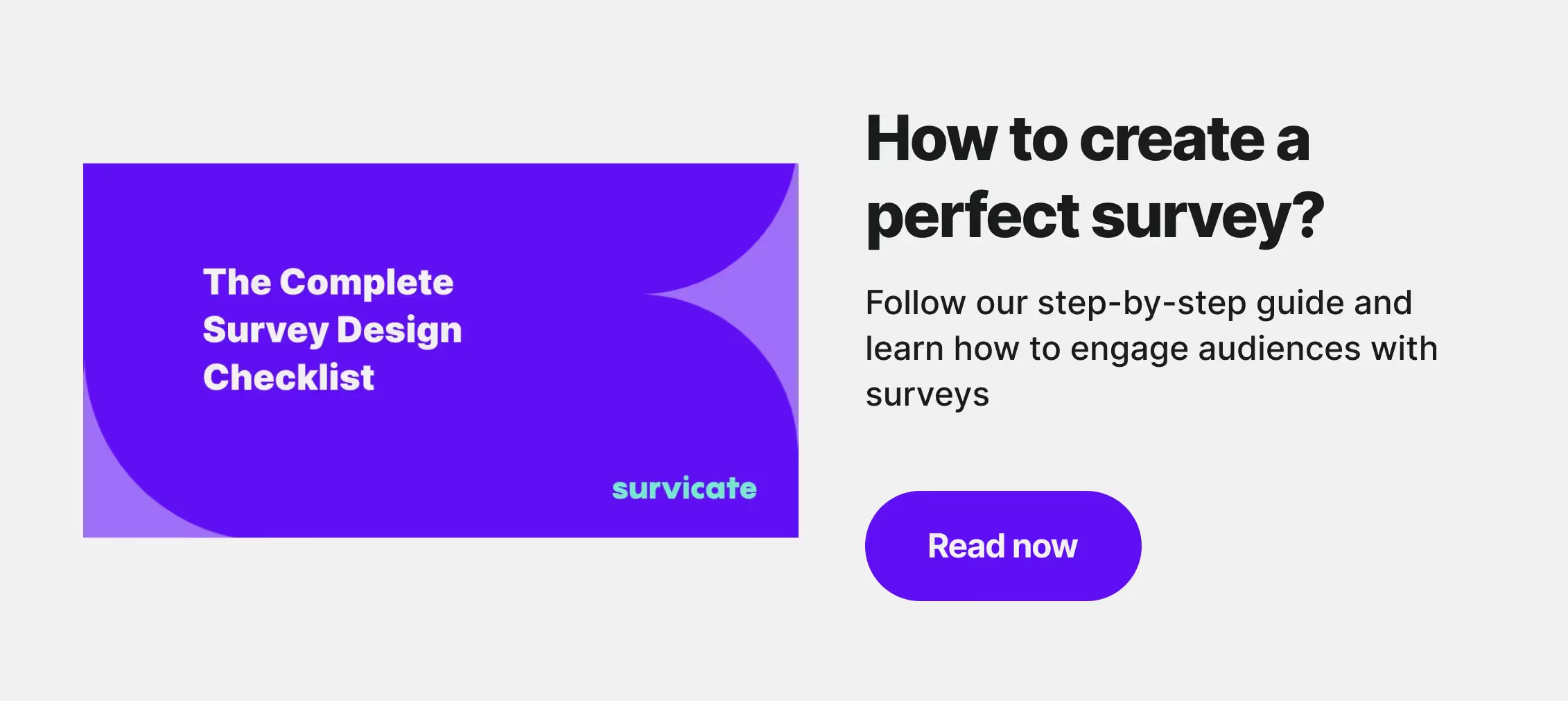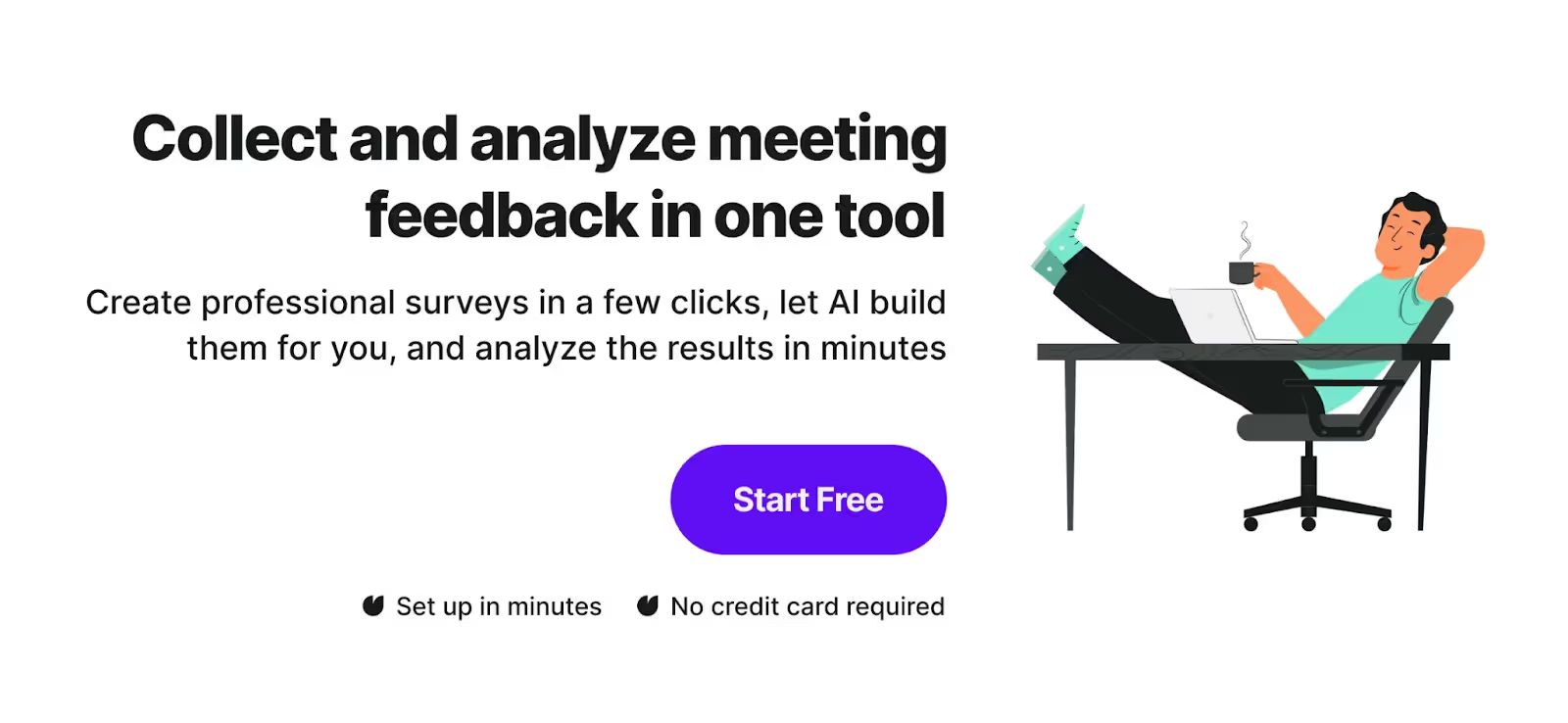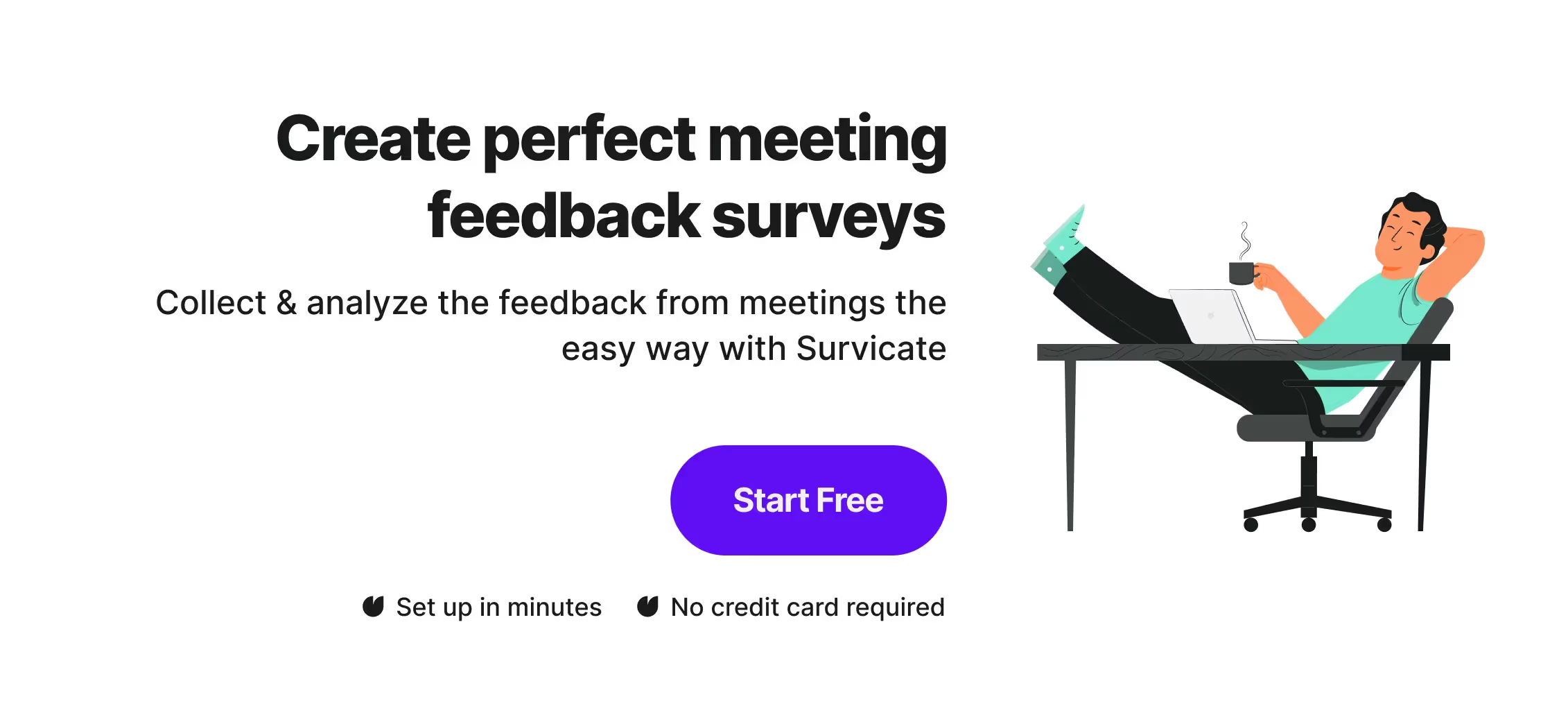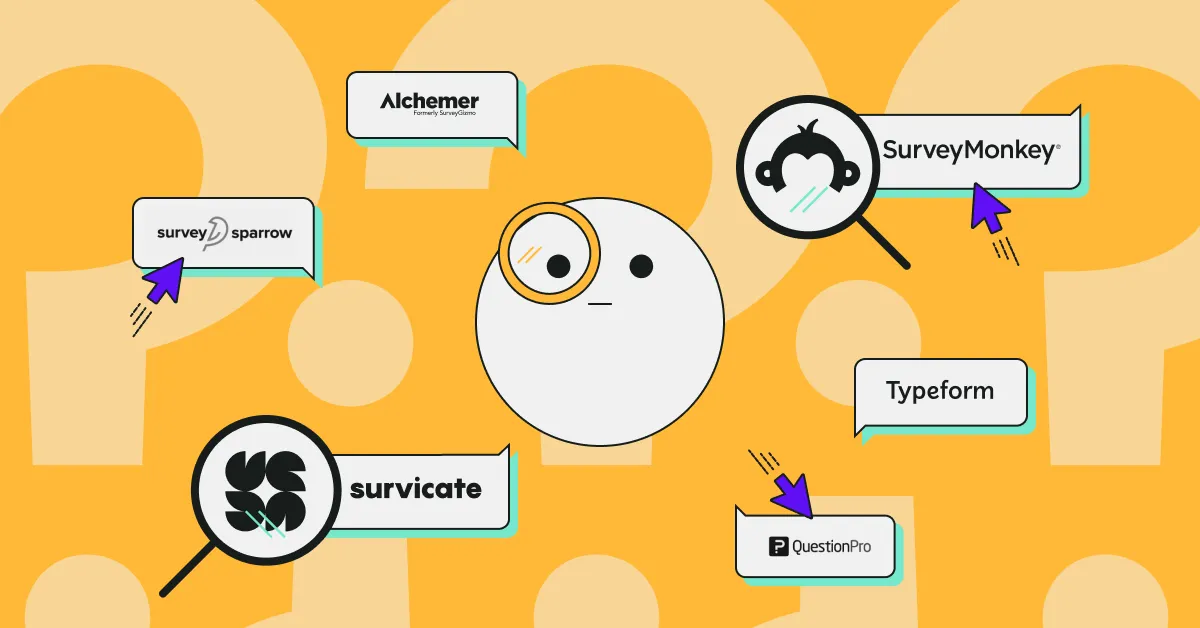Most people spend at least 3 hours every week at work stuck on meetings, with 30% of workers admitting their meeting time in a week exceeds 5 hours.
For organizations, the time spent in meetings reaches 15% of their total working time, while a staggering 71% of them is deemed unproductive. All in all, meetings can take quite a lot of our time, but what's even worse is when they're not contributing to anything positive while eating away all that time.
So how do you avoid such dull fate?
If you’ve ever asked yourself this question, you’re not alone. In fact, this question is one of the many reasons meeting feedback surveys exist.
In this article, we’ll tell you all about meeting feedback surveys: what they are, why they’re important, and what are the right meeting feedback survey questions you should ask for the best results.

What is a meeting feedback survey?
A meeting feedback survey is an online form you send out after a meeting to its participants to get feedback on how it went.
Overall, a feedback survey is ideally short and to the point. You can use it to get feedback on:
- The meeting agenda,
- The meeting host,
- The meeting length,
- The meeting effectiveness,
- The clarity of the objectives,
- Participants' expectations,
- The number of invitees,
- And much more.
Now, to create a great meeting feedback survey and improve your next meeting, you need to ask the right post-meeting survey questions. We’ll show you 24 on-point examples below, divided into 5 meeting feedback survey question types, from general to employee satisfaction.
Let's get to it.
5 meeting feedback survey question types + question examples
Depending on the kind of feedback and answers you’re looking for, you need to use various types of meeting feedback survey questions. Here are some of the most common types along with examples you can use today.
1. General meeting feedback survey questions
Maybe you don’t want to get highly specific insights, and all you need is a quick check on how different attendees perceive your meetings.
You can use these questions for a quick pulse check and ensure you’re hosting your meetings well. As a bonus, your future events will be even better.
- How did you find the meeting experience overall?
- Did you feel engaged during the meeting?
- Did the meeting meet your expectations?
- What would make these meetings more effective in the future?
- Were the key messages and objectives clear and well communicated?
- On a scale from 1 to 10, how satisfied are you with the meeting?
2. Meeting effectiveness questions
To determine if everything was clear and if all the information was understood, you can ask this set of meeting effectiveness survey questions.
- Did you find today’s meeting useful?
- What was the most useful part of this meeting?
- Were the messages and objectives clearly communicated?
- Do you have a clear idea about the action points you need to take after the meeting?
3. Meeting performance questions
If you sit down for a meeting and get nothing done, it’s just a friendly conversation instead of a productive work meeting.
Ask these post-meeting survey questions to make sure the meeting was a good use of everyone’s time.
- Do you feel that we achieved the goals set before the meeting?
- Did this meeting feel like a productive use of your time?
- Is there something that would have been a more productive way to spend time at work?
- Was the meeting agenda suitable?
- Did the meeting cover topics relevant to your job role or responsibilities?
- Did the meeting take the set time?
4. Employee satisfaction questions
There are not many people who adore the idea of meetings, and in reality, they don't necessarily need to be super fun. Yet, they should still feel fulfilling in terms of getting things done, going over the right objectives, and not wasting anyone's time.
Therefore, it’s great to gauge your employees’ satisfaction every once in a while and determine if they (dis)like their meetings. For this occasion, use these post-meeting feedback survey questions.
- On a scale from 1 to 10, how satisfied are you with the meetings you have in this company?
- Do you feel like your presence is needed at these meetings?
- What is the one thing you would do to make these meetings more enjoyable?
- On a scale from 1 to 10, how much are you looking forward to more meetings like this one?
5. Personal and professional development questions
There are many types of outcomes from a meeting, and one of the most important ones is ensuring that the employees are growing personally and professionally. You can check this with these questions to get insightful answers and suggestions for future meetings.
- Do you feel these meetings enable you to grow professionally in your role and career?
- On a scale from 1 to 10, how useful do you find our meetings for your personal development?
- Do you have enough opportunities to ask questions about developing your career?
- What specific insights or skills can you draw from the meeting?
4 benefits of gathering meeting feedback
It’s not a secret that many office workers hate meetings. So, why send a meeting feedback survey to make that feeling even stronger?
Well, you can't fix something you didn't even know was broken in the first place. Asking the right questions after the meeting takes place, allows you to make appropriate changes to your meetings in the future. Making it all less painful.
Take a look at four actionable benefits collecting meeting feedback brings below.
1. Find out which meetings are productive and necessary
You might think a meeting is required just because you booked it to discuss critical issues, but all the other participants could have different feelings. Especially for recurring meetings, a post-event survey can show you which meetings are actually productive and which ones drain time and energy.
The biggest benefit here is assessing which recurring meetings make sense and which ones don’t.
One-off meetings are not such a huge issue here, but if you repeat meetings daily and weekly, you want to get feedback about them. All you need is to ask the right post-meeting questions.
2. Cut down on wasted time and increase meeting productivity
There’s a handy calculator that we love, which lets you calculate the cost of your meetings. Putting time into money.
You basically enter how many people are attending the meeting and what their average salary of the employees is, and it shows you how much your meeting is costing you as it’s going on.
This is precisely the principle of meeting feedback surveys.
With them, you can determine which meetings should be canceled so everyone can do something to increase their productivity and save the company’s money.
3. Shorten existing meetings or change the guest list
Remember the calculator above? As the cost increases, you’ll slowly start realizing that maybe the meeting does not need to be as long. Or maybe you can invite fewer people?
The famous Jeff Bezos of Amazon came up with a rule: there should be no more people in a meeting than two large pizzas can feed. The famous two pizza rule is an excellent method to determine if you have too many invitees.
Make the meeting surveys anonymous if you want to give people a safe space. That way, those who don’t feel like they should be there can actually voice their opinions.
4. Increase satisfaction with future meetings
As you figure out which meetings need to be shorter, have better structure, and have fewer guests, or which ones shouldn't even take place, you’ll notice everyone becoming more eager to participate.
And thanks to meeting feedback surveys, you’ll have a quantitative measure of how satisfied people are with the meetings they attend.
Don’t fear negative feedback, as inevitably there will be some. Your aim is to solve problems and create effective meetings, so that will require bearing through some initial backlash.
5 Tips for running meeting feedback surveys
Now that we have you convinced in the value of meeting feedback surveys and know the right questions to ask, you’re probably wondering where and how to get started.
Here are some practical tips if it’s your first time running meeting feedback surveys.
1. Use survey software
An easy start into creating and distributing meeting feedback surveys is using a proper tool, like Survicate.
Here are a few reasons why:
🎯Professional email & links surveys created in just a few clicks—think smiley scale, Matrix questions, open & close-ended questions, and more, all on a modern interface,
🎯AI survey creator for an even more effortless process—you prompt it and it gives you a ready-made survey,
🎯Various customization options to make the surveys fit your brand—from changing the colors to adding logos, so that every attendee filling out the survey is on the same page.

But it’s not just creating meeting feedback surveys that tools like Survicate make easy, it’s also…data analysis made effortless.
Focused on running surveys, we may forget that all this data will eventually have to be analyzed in order to extract insights and take proper action going forward.
With features like Survicate’s Insights Hub and Research Assistant, you can also easily analyze the survey results and draw the necessary conclusions much faster.
Insights Hub will transcribe the feedback meetings for you and then automatically extract all the important insights, categorizing them into topics for easier navigation.
Research Assistant will help you dive deeper into the meeting feedback data. You just ask it a question, and it gives you an answer based on the connected data. Think of it like ChatGPT, but connected to your feedback information.

Finally, proper survey software is also all about connecting it with tools that matter most.
In the case of meetings, you can easily integrate tools like tl;dv or Gong to automatically sync your calls with Survicate’s Insights Hub for transcriptions and AI data analysis.
2. Send the surveys immediately after the meeting
Humans are not naturally great at remembering things long-term, especially now with all the information overload.
For the best information recall and the most accurate results, send your surveys right after the meeting ends.
3. Incentivize feedback
Survey incentives do work if you want to get higher survey completion rates.
Think of an incentive that won’t break the bank, such as a voucher for Amazon or just… fewer meetings in the future?
If you notice that people are not so eager to participate in your surveys, think of small incentives you can offer, but don’t go overboard. If your incentives are too generous, your participants may fill out the surveys just to grab them. After all, we need genuine insights.
4. Use a mix of open-ended and close-ended questions
Both open-ended and close-ended questions work well in surveys. Choose the type to use based on the information you need from your survey participants.
An open-ended question is excellent for qualitative feedback, but close-ended questions are ideal for quick, measurable insights.
5. Act on the feedback from the surveys
What good are the survey results if you don’t do anything with the feedback?
Make sure to act on your feedback and change your meetings according to the responses that come in from your employees, partners and other people you meet with. That way, your next meetings will not only be better but your employees will also be more satisfied.
Create perfect meeting feedback surveys with Survicate
Creating your first meeting feedback survey shouldn’t take longer than a typical meeting. All you need is an intuitive survey software such as Survicate, and you can get insightful feedback on your meetings in as little as 15 minutes with all the right meeting feedback survey questions.
Elevate your customer feedback analysis with Survicate.
Test out essential features during a 10-day trial by signing up or go ahead and review our pricing first.

This article was originally written by Mile Zivkovic who's a former contributor to Survicate's blog.











.webp)



.svg)

.svg)


